
The Allman Brothers Band were an American rock band formed in Jacksonville, Florida in 1969 by brothers Duane Allman and Gregg Allman, as well as Dickey Betts, Berry Oakley (bass), Butch Trucks (drums), and Jai Johanny "Jaimoe" Johanson (drums). Subsequently, based in Macon, Georgia, they incorporated elements of blues, jazz and country music and their live shows featured jam band-style improvisation and instrumentals.

Eat a Peach is a 1972 double album by American rock band the Allman Brothers Band, containing a mix of live and studio recordings. Following their artistic and commercial breakthrough with the July 1971 release of the live album At Fillmore East, the Allman Brothers Band got to work on their third studio album. Drug use among the band became an increasing problem, and at least one member underwent rehab for heroin addiction. On October 29, 1971, lead and slide guitarist Duane Allman, group leader and founder, was killed in a motorcycle accident in the band's adopted hometown of Macon, Georgia, making it the final album to feature him.

Forrest Richard Betts is an American guitarist, singer, songwriter, and composer best known as a founding member of the Allman Brothers Band.
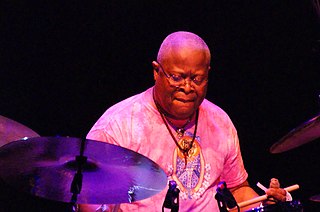
John Lee Johnson, frequently known by the stage names Jai Johanny Johanson and Jaimoe, is an American drummer and percussionist. He is best known as one of the founding members of the Allman Brothers Band.

The Allman Brothers Band is the debut studio album by American rock band the Allman Brothers Band. It was released in the United States by Atco Records' subsidiary Capricorn on November 4, 1969, and produced by Adrian Barber. Formed in 1969, the Allman Brothers Band came together following various musical pursuits by each individual member. Guitarist and bandleader Duane Allman moved to Jacksonville, Florida where he led large jam sessions with his new band, one he had envisioned as having two guitarists and two drummers. After rounding out the lineup with the addition of his brother, Gregg Allman, the band moved to Macon, Georgia, where they were to be one of the premiere acts on Capricorn.

"Jessica" is an instrumental piece by American rock band the Allman Brothers Band, released in December 1973 as the second single from the group's fourth studio album, Brothers and Sisters (1973). Written by guitarist Dickey Betts, the song is a tribute to gypsy jazz guitarist Django Reinhardt, in that it was designed to be played using only two fingers on the left hand.
"In Memory of Elizabeth Reed" is an instrumental composition by the American group The Allman Brothers Band. It first appeared on their second studio album, Idlewild South (1970), released on Capricorn Records. The jazz-influenced piece was written by guitarist Dickey Betts, among his first writing credits for the group. Betts named it after a headstone he saw for Elizabeth Jones Reed Napier in Rose Hill Cemetery in the band's hometown of Macon, Georgia. Multiple versions of the composition have been recorded, with the version performed on the group's 1971 live album At Fillmore East generally considered the definitive rendition.
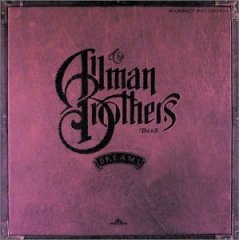
Dreams is a compilation album by the Allman Brothers Band. Packaged as a box set of four CDs or six LPs, it was released on June 20, 1989.
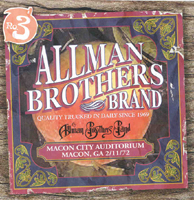
Macon City Auditorium: Macon, GA 2/11/72 is a two-CD live album by the Allman Brothers Band. It was recorded at the Macon City Auditorium in Macon, Georgia on February 11, 1972. The third archival concert album from the Allman Brothers Band Recording Company, it was released in 2004.

Nassau Coliseum: Uniondale, NY: 5/1/73 is a two-CD live album by the Allman Brothers Band. It was recorded at Nassau Coliseum in Uniondale, New York on May 1, 1973. The fourth archival concert release from the Allman Brothers Band Recording Company, it features the 1972 to 1976 lineup of the band – Gregg Allman, Dickey Betts, Chuck Leavell (piano), Lamar Williams (bass), Jaimoe (drums), and Butch Trucks (drums). It was released in 2005.

Seven Turns is the ninth studio album by the Allman Brothers Band, released in 1990. Their first studio album since Brothers of the Road in 1981, it was well-received, and peaked at #53. Hit singles were "Good Clean Fun" ; "Seven Turns" (#12) and "It Ain't Over Yet" (#26).
"Blue Sky" is a song by the American rock band The Allman Brothers Band from their third studio album, Eat a Peach (1972), released on Capricorn Records. The song was written and sung by guitarist Dickey Betts, who penned it about his girlfriend, Sandy "Bluesky" Wabegijig. The track is also notable as one of guitarist Duane Allman's final recorded performances with the group. The band's two guitarists, Duane Allman and Dickey Betts, alternate playing the song's lead: Allman's solo beginning 1:07 in, Betts joining in a shared melody line at 2:28, followed by Betts's solo at 2:37. The song is notably more country-inspired than many songs in the band's catalogue.
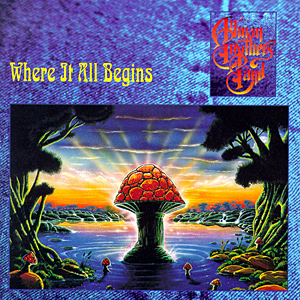
Where It All Begins is the eleventh studio album by the Allman Brothers Band. "No One to Run With" obtained the most album-oriented rock airplay, while "Soulshine", written by Warren Haynes, gained success as a concert and fan favorite. Gregg Allman also started to confront his substance abuse problems in the past on songs such as "All Night Train". The album sold considerably better than its predecessor, Shades of Two Worlds. In 1998, the album went Gold. Nevertheless, critical reception was weaker. This was also the last studio album the group recorded with original guitarist Dickey Betts.

Reach for the Sky is the seventh studio album by the rock group the Allman Brothers Band, released in 1980. It was the last album to feature drummer Jai Johanny Johanson until his return on the Seven Turns album.

Brothers of the Road is the eighth studio album, and the tenth album overall, by the rock group the Allman Brothers Band. Released in 1981, it is the band's only album without drummer Jai Johanny Johanson, the last to feature bassist David Goldflies and guitarist Dan Toler, and the only one to feature drummer David Toler. The song "Straight from the Heart" was the group's third and final Top 40 hit. It was also the first Allman Brothers album to not feature an instrumental song.
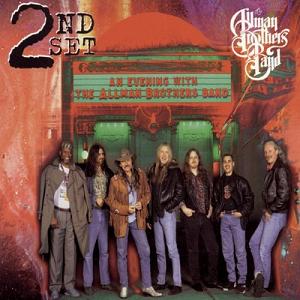
An Evening with the Allman Brothers Band: 2nd Set is a live album by the American rock group the Allman Brothers Band. It was recorded in 1992 and 1994, and released in 1995. The recording of "In Memory of Elizabeth Reed" was nominated for a Grammy Award for Best Pop Instrumental Performance at the 38th Annual Grammy Awards, but it lost to "Mariachi Suite" by Los Lobos. The recording of "Jessica" included on the album won a Grammy Award for Best Rock Instrumental Performance at the 38th Annual Grammy Awards in 1996.
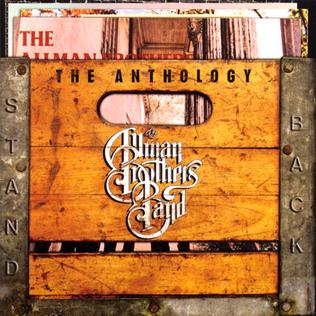
Stand Back: The Anthology is a compilation album by the Allman Brothers Band, released in 2004. It is the only retrospective which is cross-licensed among the different record labels for all of the band's studio recordings from its debut in 1969 through 2003.
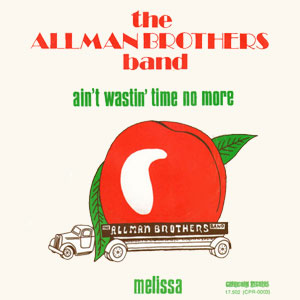
"Ain't Wastin' Time No More" is a song by the American rock band the Allman Brothers Band. It was the lead single from their third studio album, Eat a Peach (1972), released on Capricorn Records. The song, written by Gregg Allman, largely concerns the death of his brother, Duane Allman, who was killed in a motorcycle crash in 1971.

Trouble No More: 50th Anniversary Collection is a compilation album by the Allman Brothers Band. A retrospective of their entire career, it includes both studio and live tracks, and was recorded from 1969 to 2014. Comprising five CDs or ten LPs, and packaged as a box set, it was released on February 28, 2020.

















